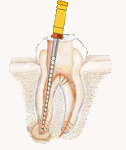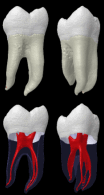
What is Root Canal Therapy?
Root Canal Therapy, also known as endodontic treatment or simply called ‘root canal’, is a dental procedure which becomes necessary for the treatment of tooth infections or tooth fractures whenever the pulp of the tooth is affected. Root canal therapy is called an endodontic (meaning ‘inside the tooth’) treatment, because it actually is the removing of the damaged living tissues from inside the tooth and replacing them with a suitable bio-compatible material.
Root Canal Treatment
Root Canal Therapy is a procedure that can save a tooth that would otherwise have to be extracted, and helps us to maintain our natural teeth for many more years.
What are Root Canals?

When we look at a tooth we see only the outer hard layer of tooth enamel. Underneath it there is a softer layer of another calcified tissue, the dentin. Finally in the center of the tooth there is a hollow chamber which contains the pulp tissue made of tooth nerves, connective tissue, and blood vessels that nourish the tooth.
At the area of the roots, narrow channels connect the tips of the roots with the pulp chamber allowing the nerves and blood vessels from the jaw to reach the center of the tooth. These channels are called ‘root canals’. The total number of root canals per tooth depends on the number of the tooth roots ranging from one to four or five in some cases. Sometimes there is more than one root canal per root.
The complexity of root canal shape, branching (especially the existence of horizontal branches), and the variation in the number of root canals are considered as the main causes of root canal complications and treatment failures.
A small secondary root canal branch that is not noticed by the dentist, and therefore it is not cleaned and filled, will remain infected causing the treatment to fail.
An unusual curve in a root canal may lead to breakage of an endodontic file or a perforation of the root causing further infection.
When you need Root Canal Therapy?
Root canal therapy is a treatment required when there is an inflammation or infection of the living tissues inside the tooth, either in the pulp chamber and the root canals (pulpitis), or the tooth is badly damaged. Conditions that may make necessary an endodontic treatment include tooth infections, deep tooth decay, tooth abscess, periodontal disease, tooth injuries or extensive structural damage after repeated dental restorative procedures.
Why you need Root Canal Therapy?
If an infection of the dental pulp is not treated with endodontic therapy, it will spread to the jaw bone and the connective tissues around the tooth. The infection will not only gradually destroy these tissues making them not longer able to hold the tooth in place, but it may also spread to other body organs. Except of tooth loss other serious complications may also occur, such as ludwig’s angina, a life threatening swelling of the neck which may be caused by infected lower molars.
Root canal therapy can save the tooth, prevent complications and provide immediate relief from the severe tooth pain caused by the pulp inflammation.
Root Canal Symptoms
A number of symptoms can reveal conditions such as a tooth infection, an abscess or a tooth fracture that make necessary an endodontic treatment. The most common pre root canal symptom is tooth pain either as a sensitivity to cold or hot, sharp pain when biting or tapping the tooth, or as a severe constant toothache in more serious cases. A swelling in the gums or pus drainage in the mouth that indicate a tooth abscess, and tooth discoloration that reveals pulp damage are also common root canal symptoms.
The Root Canal Therapy procedure
Root canal treatment is a complex procedure that involves the removal of the infected pulp tissues and nerve of the tooth, the cleaning, shaping and filling of the pulp chamber and root canals, finally followed by the restoration of the tooth with a dental crown. The procedure may take several appointments until the infection in and around the tooth is fully eliminated before it is filled and restored.
Although root canals have been considered in the past as synonymous with serious pain, the procedure itself will not cause any pain, but will actually provide relief from the toothache.
Read more about “Root Canal Procedure”
Root Canal Problems – Post Root Canal Infections
Although the failure rate of root canal treatments is less than 5 percent, some complications may occur in certain circumstances. The most common complication is a post root canal infection. This may happen for several reasons such as inadequate cleaning and disinfection, a missed canal, improper filling of the root canals, or a defective restoration. Other root canal problems can occur due to accidental root perforation or fracture during the procedure. If the tooth becomes re-infected, it will need additional endodontic treatment.
Read more about “Root canal complications - Failed root canal”
Root Canal Recovery
The normal root canal recovery time is usually short, provided there are no complications involved and you follow carefully your dentist’s post-operative instructions. The tooth may feel a bit sensitive, tender or loose for some days after treatment, due to the irritation of the hard and soft tissues around the tooth. The recovery time is usually longer if there was a large periapical abscess around the tooth roots, because the jawbone needs to heal from the infection. Over-the-counter pain medicines are normally enough to relieve any discomfort.
Read more about “Root Canal Pain”
Root Canal Cost
Endodontic therapy is an expensive dental procedure with the average cost of root canal treatment ranging from 500$ for anterior teeth to 800-1000$ or more for molar teeth. Root canal cost for back teeth is higher because they are more difficult to access and have more roots (and root canals) than front teeth. If the procedure will be performed by an endodontist you should expect a premium of about 30% to 50% compared to the root canal fee of a general dentist. The good news is that many dental insurance policies cover most of the cost of root canal therapies. Insurance coverage ranges from 50% to 80% of the cost.
Read more about “Root Canal Cost”
Root Canal by the General Dentist or an Endodontist?
Root canal treatments can be performed by general dentists, or by dental specialists in root canals, known as endodontists. After a tooth is diagnosed of needing endodontic therapy, the dentist will decide if he will do the procedure himself, or if the patient will be referred to an endodontist, depending on the complexity and difficulty of the individual case. An endodontist has additional training and expertise in performing root canals, and other special treatments such as apicoectomies and root resections.
Root Canal Alternatives
In case the pulp of a tooth is infected or damaged for any reason, you actually do not have so many alternatives. It is either root canal therapy or tooth extraction. If you choose tooth extraction, you will have to replace the lost tooth with a dental bridge or a dental implant in order to restore chewing function, appearance, and prevent adjacent teeth from shifting. Having a root canal therapy can help you maintain your natural tooth without having to spend time and money for additional treatments.
Read more about “Root Canal vs Tooth Extraction”
Modern Root Canal Equipment
One of the most difficult parts of an endodontic treatment is for the dentist to locate exactly the end of the root canal. Today it has become much more easier with the use of modern equipment known as electronic apex locators.
![]() The cost involved with root canal is significant and many patients may not afford it if they are not covered by their dental insurance.
Learn how to choose a dental insurance plan that will help you provide the best dental treatment to yourself and your family.
The cost involved with root canal is significant and many patients may not afford it if they are not covered by their dental insurance.
Learn how to choose a dental insurance plan that will help you provide the best dental treatment to yourself and your family.

